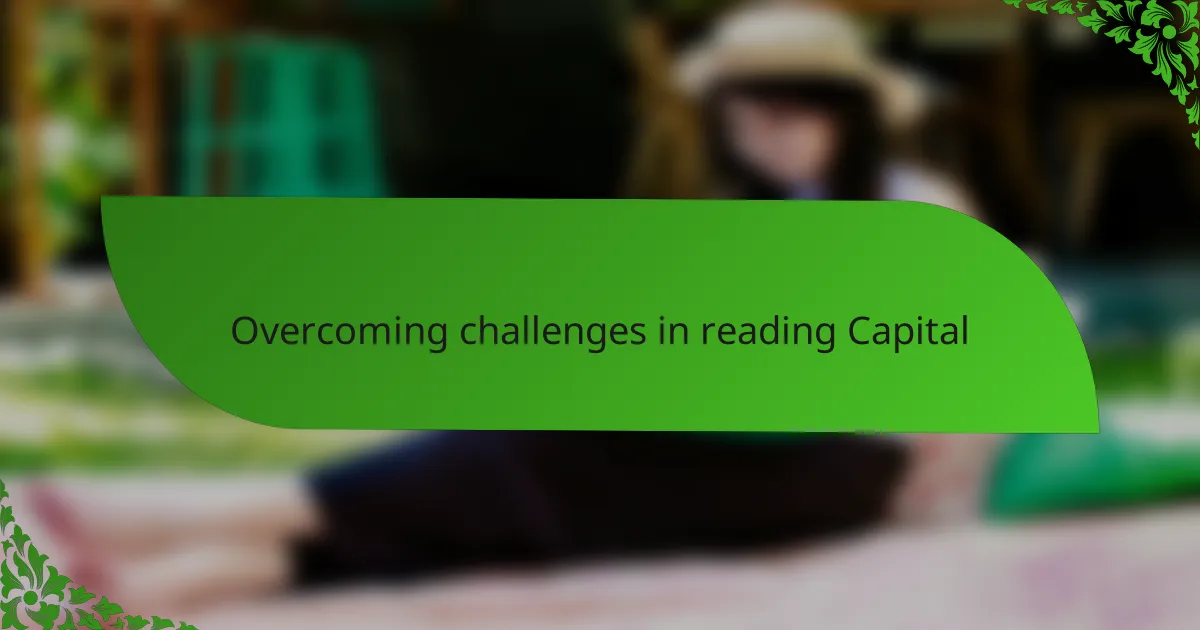Key takeaways
- Understanding Marx’s ideas, particularly commodity fetishism and surplus value, provides insight into economic systems and social justice.
- Effective study strategies include setting manageable goals, visual mapping, and engaging in discussions to enrich comprehension of complex concepts.
- Applying Marx’s theories to contemporary issues, such as income inequality and social media culture, reveals their relevance in today’s world.
- Personal reflection and iterative learning enhance the philosophical journey, making concepts more relatable and applicable to everyday life.

Understanding Marx’s Capital fundamentals
Grasping the fundamentals of Marx’s Capital felt like stepping into a dense forest for me—initially overwhelming, yet intriguing. I found that breaking down its core concepts, like commodity fetishism and surplus value, helped clear the fog. Have you ever wondered why Marx insists that labor is the source of all value? This question kept me digging deeper and made the complex theories more relatable.
What struck me most was Marx’s analysis of the capital-labor relationship. Recognizing how surplus value is extracted through exploitation shifted my understanding of economic systems. It wasn’t just abstract theory; it felt like uncovering hidden dynamics shaping everyday life and work. That realization sparked both frustration and curiosity—a blend I imagine many readers of Capital experience.
I often revisited the basic idea that commodities have both use-value and exchange-value. This simple yet powerful distinction grounded many of Marx’s arguments in a tangible way. Reflecting on this helped me appreciate how Capital isn’t merely a critique but also a deep investigation into how capitalist economies function at their core. Have you tried connecting these foundational ideas to today’s world? I found that made the text resonate far beyond the pages.

Key philosophical concepts in Capital
One key philosophical concept that stood out to me was Marx’s idea of commodity fetishism. At first, I struggled to grasp how social relations could be masked by the way commodities appear on the surface. But then I realized it’s like a veil hiding the true labor embedded in products, making us relate to things instead of people. Have you ever caught yourself valuing a branded item without thinking about who made it?
The notion of surplus value also challenged my perspective deeply. Understanding that profit arises from unpaid labor made me question common assumptions about fairness in capitalism. It felt almost unsettling to recognize exploitation isn’t just a moral failing but a structural necessity within the system. This insight transformed how I view not just economics but social justice.
Another aspect that intrigued me was Marx’s dialectical method—looking at contradictions within capitalism to reveal its dynamics. It’s like viewing history and society as constantly in motion, shaped by opposing forces. This made me wonder: can any social system last without evolving through its internal conflicts? Personally, this approach made Capital feel less like dry theory and more like an ongoing conversation about change.

Effective strategies for studying Capital
When I first tackled Capital, I found that pacing myself was crucial. Instead of trying to read large chunks at once, I set small, manageable goals—just a few pages per day—which made the dense material feel less intimidating. Have you noticed how breaking complex texts into bite-sized pieces often opens up space for deeper reflection? That slow, steady rhythm kept me from feeling overwhelmed and helped ideas sink in.
Mapping out the arguments visually also became a game changer for me. Sketching flowcharts or diagrams to trace Marx’s logic on value and capital circulation turned abstract concepts into something I could “see.” I’d ask myself: How does this step lead to the next? Putting theory into a visual format not only clarified Marx’s reasoning but sparked aha moments that pure reading didn’t deliver.
Another strategy I found surprisingly helpful was discussing Capital with others. Sharing insights and doubts in study groups made the theories come alive and exposed me to perspectives I wouldn’t have considered solo. Have you ever found that a simple question from a peer can unlock a whole new way of thinking? For me, the social aspect transformed studying from a lonely slog into a dynamic, ongoing conversation.

Overcoming challenges in reading Capital
At times, wrestling with Capital felt like climbing a steep hill with no clear path. I remember moments when dense passages triggered frustration, making me question if I’d ever grasp Marx’s arguments. But then I learned that persistence paired with patience was key—taking breaks, returning fresh-eyed, and allowing the text to slowly unfold rather than rushing through it.
One challenge I faced was deciphering Marx’s complex language, which often felt like an insider’s code. Creating my own glossary of terms and rereading difficult sections aloud helped me break that barrier. Have you ever noticed how hearing ideas spoken aloud can reveal clarity that silent reading misses? It certainly did for me, turning confusion into comprehension step by step.
Sometimes, the emotional weight of Marx’s critique made me uneasy, especially as I confronted uncomfortable truths about exploitation. Talking these feelings over with fellow readers was surprisingly liberating—it reminded me that grappling with Capital isn’t just intellectual but deeply personal. Have you experienced how shared reflection can transform reading from a solitary struggle into a collective journey? That realization kept me moving forward.

Applying Capital to contemporary issues
Applying Capital to contemporary issues sparked my curiosity about how Marx’s critique still pulses beneath today’s economic headlines. When I looked at growing income inequality, I couldn’t help but see surplus value extracted more intensely than ever, hidden behind high-tech gadgets and global brands. Doesn’t it make you wonder how digital labor, often unpaid or underpaid, fits into Marx’s framework?
I also found that commodity fetishism feels eerily alive in social media culture. The way we chase likes and viral trends reminded me of Marx’s point: we relate to images and symbols instead of the real human labor behind them. Have you noticed how that shapes our desires and even our sense of identity?
At times, applying Capital felt like using an old map in a new city—some landmarks shifted, but the underlying routes remained. Concretely, I saw the theory illuminate modern debates on automation and worker displacement. It raised questions for me: Can Marx’s insights guide us toward solutions that balance technological progress with human dignity? That ongoing tension keeps the conversation vital.

Personal insights from navigating Capital
Navigating Capital wasn’t just an intellectual challenge—it was an emotional journey. I often felt a blend of awe and frustration, as if Marx’s dense prose was daring me to uncover the layers beneath. Did I sometimes want to give up? Absolutely. But those moments made the eventual clarity feel all the more rewarding.
One insight that stuck with me was how Marx’s analysis forced me to rethink everyday experiences, like shopping or working. I began to see these through a new lens, recognizing the invisible forces shaping them. Have you ever caught yourself questioning something ordinary, only to realize there’s a much deeper story behind it? That revelation kept me hooked.
I also found that personal reflection was crucial to my progress. Writing down how Marx’s ideas resonated—or clashed—with my own views helped me process the complexity. For instance, wrestling with the idea of exploitation stirred up a mix of indignation and empathy. That emotional engagement made Capital more than a book; it became a mirror reflecting parts of myself.

Practical tips for ongoing philosophy education
Continuing philosophy education demands a mindset that embraces curiosity over quick answers. I learned that revisiting challenging texts regularly, even after the first read, reveals new layers each time. Have you ever reread a passage and suddenly found an idea that slipped by unnoticed before? That iterative process turned steady learning into a rewarding habit.
Another practical tip that worked well for me was integrating philosophy into daily life conversations. Bringing up concepts from Capital in casual talks didn’t just reinforce my understanding—it sparked fresh questions and debates I hadn’t considered. When you share philosophical ideas aloud, do you notice how your perspective sharpens and grows through others’ reactions?
Lastly, setting realistic, flexible goals helped me stay motivated in the long haul. Philosophy isn’t a race but more like a winding path, so I gave myself permission to pause, reflect, or even switch topics when energy dipped. Have you tried adapting your study rhythm to your own pace? In my experience, this kindness toward myself prevented burnout and kept the journey enjoyable.